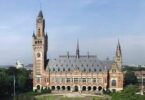Monitoring Desk
BARCELONA: Spain and Portugal will agree to place restrictions on tourism between the two countries from Monday to curb the spread of coronavirus, at a time Portuguese officials gear up for talks on whether or not to declare a state of emergency.
Portuguese Prime Minister Antonio Costa said travel restrictions on the land border between the two countries should guarantee that free movement of goods continues and protect the rights of workers, but that “there must be a restriction (on travelling) for the purposes of tourism or leisure”.
“There will be no tourism between Portugal and Spain in the coming months,” he said, adding that the measure is important as there is a significant flow of tourists between the two countries during the fast-approaching Easter season.
Portugal’s tourism industry is already feeling the impact of the coronavirus, with the country’s AHP hotels association saying on Thursday the hotel sector could lose 30 percent to 50 percent of its revenues between March and June.
Portugal attracts millions of foreign visitors annually. The tourism sector, which accounts for nearly 15 percent of gross domestic product, was a key driver of the country’s recovery from the 2010-14 debt crisis.
Spain put its 47 million inhabitants under partial lockdown on Saturday as part of a 15-day state of emergency to combat the epidemic in Europe’s second worst-affected country after Italy.
Even though Portugal has reported 245 confirmed cases of coronavirus, far below Spain’s 7,753, the Portuguese government declared a “state of alert” on Friday until April 9.
But, in a video address, Portugal’s President Marcelo Rebelo de Sousa, who is currently in voluntary quarantine at home despite testing negative for coronavirus, said he will call the state council for Wednesday to discuss if the country should declare a state of emergency.
“What needs to be decided, will be decided. Measures that need to be taken, will be taken,” Rebelo de Sousa said.
A few hours before Rebelo de Sousa’s message, Costa said the government would not object if the president decides a state of emergency is the best way forward to fight the coronavirus.
According to Portuguese law, a state of emergency can only be declared if there is an “imminent” or “serious threat”, and can only last up to 15 days. If declared, it would mainly limit people’s movements nationwide.
To contain the coronavirus, Portugal has already suspended classes across the education system, from kindergartens to universities, both public and private.
There are about 2 million school children in Portugal, a nation of just over 10 million people.
Cruise ships are no longer allowed to disembark passengers except those residing in Portugal, night clubs have shut and there are capacity restrictions on entry to shopping malls, restaurants and terraces.
Further measures were announced by Portugal’s internal affairs minister Eduardo Cabrita on Sunday, including a ban on drinking alcoholic beverages in the street.
The drinking ban is aimed at steering partygoers away from the streets after bars were ordered to close at 9 p.m. every night.
Driving classes will be temporarily suspended, and events in enclosed space have been limited to fewer than 100 people.
Courtesy: (Reuters)






